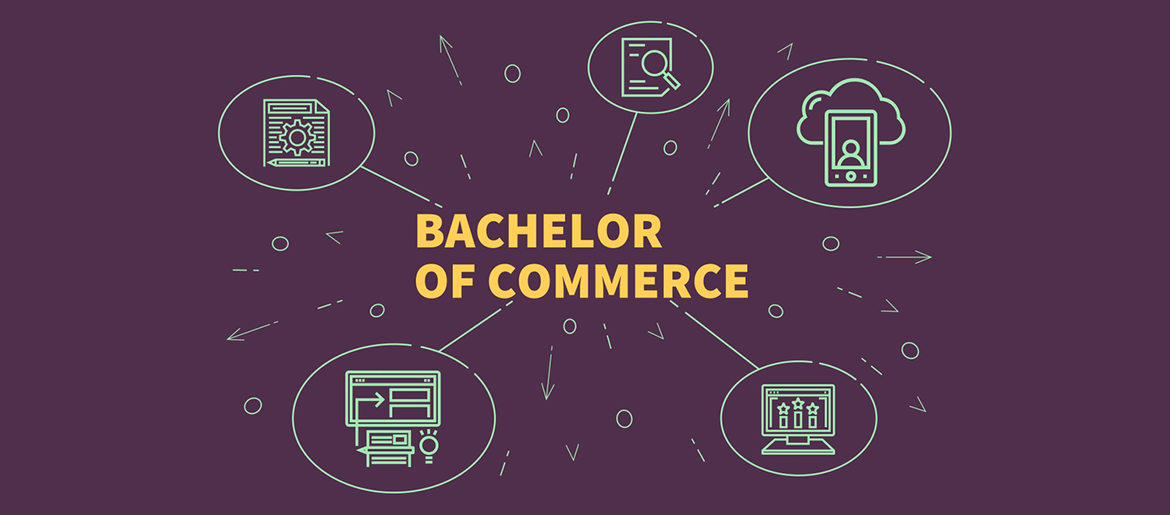Every one of you must be well aware of B.Com full form. It stands for Bachelor of commerce. B.Com is a well-reputed course and generally pursued by students who have passed their 10+2 in commerce stream. However, a student from other streams can also pursue this course. There is no particular entrance exam to enter this course. Students can join this course based on the marks they have acquired in their 10+2 exams.
B.Com syllabus (which we shall discuss in the latter part of this blog elaborately) contains subjects such as Accountancy, Financial Systems and Business Management that helps to form a good base for the students who wish to study further in courses like MBA and PGDM. These courses form a solid base for the students and help them excel in MBA and PGDM courses. MBA accounts for a higher number of jobs in India and abroad with a lucrative salary. Hence, B.Com students have the upper hand amongst their peers pursuing other subjects. It is a skill-based job offering guaranteed employment.
As we are clear about the B.Com full form now and its scope, in brief, let’s look at some essential features of this course.
1. B.Com course: Highlights
| B.Com full form | Bachelor of Commerce |
| B.Com course level | Graduate |
| B.Com Course Duration | 3 years |
| B.Com Eligibility | 12th pass |
| B.Com course fee | Ranges between INR 10,000 to INR 50,000 |
| B.Com examination type | Semester Pattern |
| B.Com Admission | Admission granted by university-based on 12th score. Direct Admissions in private colleges. |
| B.Com Recruiting Companies | ICICI, HDFC, PwC, LIC, Bajaj Allianz, SBI |
2. B.Com Course Duration
The B.Com degree course is divided into three years of Education. You have to select one specialization for every year. Each year you are allowed to have two backlogs. You have to clear the backlog subjects in the next Semester to move to the following year. If you can’t clear them or fail more than two subjects, you must repeat the year.
3. B.Com course Eligibility Criteria
Not everyone is eligible to do B.Com; you have to fit into the eligibility criteria to get into the course. Here are the eligibility criteria:
- Students who have passed their 12th in commerce stream, whereas students from other streams can also apply.
- There is a certain cut-off percentage that the college or university sets. You need to achieve that cut-off percentage by either scoring equal to the same or higher than that. Colleges keep reducing cut-off percentages till seats get full.
- Private colleges can intake students directly irrespective of the cut-off percentage.
4. B.Com Course Fees
One of the biggest reasons students choose B.Com is that it is one of the most affordable degrees that provides excellent career options. The course fees start from INR 10,000 TO INR 50,000 depending upon the various colleges. But, as a whole, the course fees are very nominal where the students get a full value for money.
5. B.Com Syllabus
The B.Com subjects in most of the universities are the same. Here is the complete syllabus for B.Com, which is divided into six semesters in 3 years. There is a list of common subjects, and then there is a list of new subjects or specializations added each year.
Common Subjects
- Accounts
- Math
- Economics
- Marketing
- Company Law
- IT
- Tax
- Banking and Financial Systems
1st Semester
- Accounts
- Math or Computer
- Economics
- Business Communication
- Computer Applications and IT
- Environment and Public Health
- English
- Second Language
2nd Semester
- Accounts
- Math
- Economics
- Management
- Computers
- General Awareness 1&2
3rd Semester
- Indian Economy
- Banking and Insurance
- Income Tax Laws
- Microeconomics- I
- Financial Markets and Institutions
- Corporate Accounting-I
4th Semester
- Overheads SPL
- Elements of Company Law-II
- Corporate Accounting
- Macroeconomics-II
- Basics of Cost Accounting Labor
- Managerial Communication
- Marketing Management
- Business Communication
- Indian Banking System and Central Banking
5th Semester
- Income Tax
- Entrepreneurship
- Cost Accounting
- Banking and Financial Systems
- Marketing Management
6th Semester
- Mercantile Law
- Advanced Accounting Paper-2
- B.Com Indirect Taxes Paper 2
- Marketing Management
- Contemporary Indian Economics Issues and Policies
Now that we understood the B.Com full form and its features, including the syllabus, let’s look at the difference between B.Com and B.Com (Honors).
Difference between B.Com and B.Com (Honors)
There is a fundamental difference between B.Com and B.Com (Honors). B.Com (Honors) is a part of B.Com. While B.Com consists of the general subjects, B.Com (Honors) contains subjects with broad specializations. Where B.Com is more commerce and job-oriented, B.Com (Honors) is more business-oriented.
Both the degrees are designed to offer the students the best Education. B.Com general is suitable for students who want to pursue CA and CS. In contrast, B.Com (Honors) is ideal for students who wish to pursue MBA and PGDM in their further Education. Students can consider both degrees for a good career.
Why is a B.Com degree great for your corporate career in India?
Over the decades, B.Com is a course pursued by many students in India, especially those who want to pursue a career in the commercial and corporate sectors. B.Com is different from the other popular courses because its scope of gaining knowledge and hands-on experience in the corporate world differs from other courses.
In India, B.Com is a highly career-centric course, like in other countries, wherein the students are trained in different aspects of commerce and entrepreneurship. Candidates in this course are trained to face challenges and also provided to give a new perspective in the field as well.
Now we shall discuss why a B.Com degree is excellent for a career in the corporate sector.
1. Training in a wide range of topics
As an undergraduate course, B.Com graduates are majorly trained in the subjects such as Commerce, Finance and Banking. However, there are also other specializations which by studying they shall qualify themselves for working in different sectors and industries. The top specializations opted by B.Com aspirants include
- Accounts and Finance
- Banking and Insurance
- Economics
- Human Resources
- Marketing
- Law
- Corporate Secretaryship
- Information Technology
- Tourism and Travel Management
- Taxation
2. Good Opportunities related to employment
In India, B.Com is one of the rare fields of study that offers excellent employment opportunities. India follows a capitalistic system where commerce and trade are among the top players of an economy. A B.Com graduate, through their field of study and specialization, can attract jobs both in the public and private sectors, thereby increasing their chances to build a lucrative career path for themselves.
Also, a B.Com graduate who can enhance their skills and put them to use in terms of various usages in different sectors will attract more job and career development opportunities.
3. Immense Future Prospects
While a three year B.Com course is viable enough to get a high paying job, many of the students prefer to pursue a higher education after their B.Com course. This increases their chances to get a high paying job and climb the ladder of achieving higher managerial positions. These additional degrees shorten the journey of climbing the ladder to managerial positions and also get a lucrative salary.
These are the commonly opted higher Education and career paths by B.Com graduates in India.
- Chartered Accountancy
- MBA
- M.Com
- LLB
4. Job profile and Areas of Employment
One of the critical features of a B.Com graduate is that they can attract various job profiles and areas of employment. As they have pursued various specializations during their course term, they are eligible for different commerce-related profiles and roles. These are some of the job profiles and areas of employment for a commerce graduate in India.
B.Com job profiles
- Accountant
- Business Analyst
- Stock Broker
- Finance Officer
- Company Secretary
- Tax Accountant
- Teacher
- Finance and Accounting Managers
- Budget Analysts
B.Com Areas of Employment
- Government and Private Banks
- Marketing Industry
- Investment Industry
- Policy Planning
- Budget Planning
- Educational Institutions
- Business Consultancies
5. High Packages
As mentioned above, whether it is a government or a private organization, the employment opportunities of a B.Com graduate is immense so is their salary packages. The salary package of a B.Com graduate fresh out of college is 2 00,000 to 4 50,000. But, as they continue their job, their salary will depend upon many factors such as years of professional experience, level of academic qualification, area of specialization, etc.
| Category | Annual Salary |
| Fresher/Initial Salary | 2,00,000 – 4,50,000 |
| Median Salary | 4,50,000 – 7,00,000 |
| High/Senior Level Salary | 8,00,000 – 11,00,000 |
After discussing quite a bit about the B.Com full form and other information regarding this course for some time now, I will wrap up this blog by quickly discussing the ten best colleges (region wise) to do B.Com in India.
1. Shri Ram College of Commerce Delhi (North Central India)
2. Loyola College, Chennai (South India)
3. Kaziranga University, Assam (East India)
4. Royal Global University, Assam (East India)
5. Hindustan Institute of Technology and Science, Chennai (South India)
6. Shobhit University, Meerut (North India)
7. Symbiosis College of Arts and Commerce, Pune (West India)
8. Madras Christian College, Chennai (South India)
9. St. Xavier’s College, Kolkata (East India)
10. Indraprastha College for Women, Delhi (North Central India)





